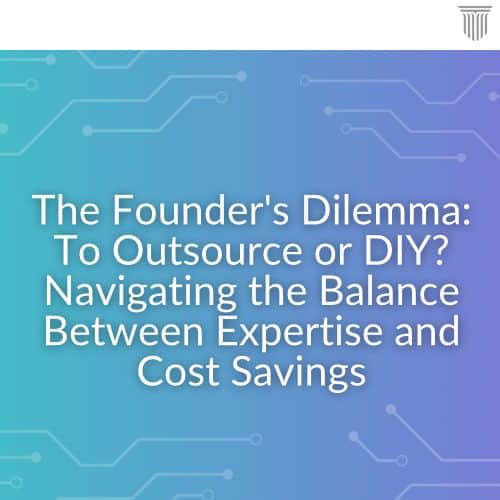Outsourcing has become increasingly common among businesses of all sizes, as it offers numerous benefits that can help companies to save money, increase efficiency, and achieve better results. However, there are also potential drawbacks to outsourcing, and knowing when to outsource and when to keep tasks in-house can be a difficult decision for many founders.
The Benefits of Outsourcing
One of the primary advantages of outsourcing is that it allows businesses to focus on their core tasks and growth opportunities. By outsourcing tasks such as bookkeeping, HR management, or marketing, companies can free up valuable time and resources that can be devoted to more important tasks. This can help to improve efficiency, reduce costs, and increase overall profitability.
Access to Specialized Skills and Expertise
Additionally, outsourcing can provide access to specialized skills and expertise that may not be available in-house. For example, hiring a lawyer or accountant can help to ensure that your business is legally compliant and financially sound, while hiring a marketing specialist can help to develop and execute effective strategies that can drive growth and revenue.
On the other hand, outsourcing can create a sense of detachment from certain aspects of your business, which can lead to a lack of understanding and control. This can be particularly true when outsourcing critical functions such as IT management, where a lack of control can result in security vulnerabilities or other risks.
Cost Considerations
Another potential drawback of outsourcing is cost. While outsourcing can be more cost-effective than hiring employees in certain cases, it can also be expensive, particularly when hiring specialists for legal or financial services. The costs of outsourcing can quickly add up, and businesses must carefully weigh the benefits against the costs before making a decision.
Furthermore, outsourcing can make a business vulnerable to the reliability and quality of the services provided by third-party contractors. If the quality of work provided by a contractor is subpar, or if the contractor is unreliable, it can have a negative impact on the business’s operations and reputation.
Analyzing Business Processes
So, how can founders decide when to outsource and when to keep tasks in-house? One approach is to analyze every step of your business processes and identify where you can handle things on your own, and where you may need to bring in experts. This can help to streamline operations and avoid wasting money on unnecessary expenses.
For example, when it comes to handling SR&ED applications, it may make sense to handle the initial stages of the process in-house, but then bring in experts to finalize the claim and maximize potential savings.
Final Thoughts
In conclusion, outsourcing can offer numerous benefits to businesses, but it is important to weigh the pros and cons before making a decision. By carefully analyzing business processes and identifying where outsourcing can be beneficial, businesses can maximize efficiency and profitability, while minimizing risks and unnecessary expenses.







